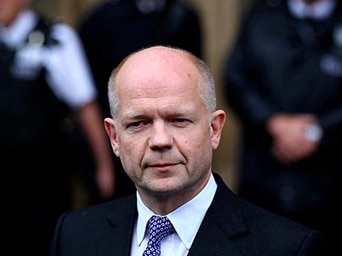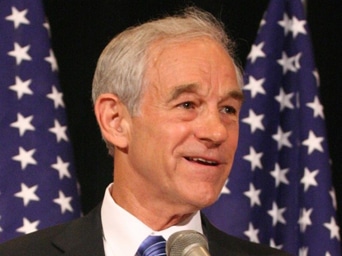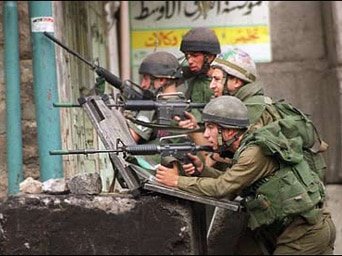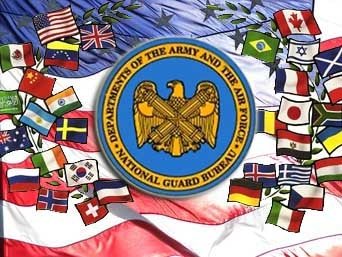Tag: Foreign Policy
US Foreign Policy Calculated Cul-De-Sac
The siege mentality that successive teams of US policy makers have finessed to perfection in the last decade in Pakistan and Afghanistan was inspired by the famous Bush slogan ‘who is not with us, is against us’.
Israel’s False Flag Operation Against Iran
A series of CIA memos describes how Israeli Mossad agents posed as American spies to recruit members of the terrorist organization Jundallah to fight their covert war against Iran.
Iran: Economic Sanctions the Diplomacy of Cowards?
Britain’s foreign secretary William Hague is taking a long time to answer the sort of questions he must have mulled over before starting this country along another warmongering road to hell.
America on Israel’s Altar
The label has been attached to Paul primarily because he differs from the other Republican presidential candidates on foreign policy. Said The Globe after the presidential debate In Des Moines, Iowa on December 10th:
Operation Cast Lead and a 2012 Deja Vu
Exactly three years after Operation Cast Lead, Israel is threatening another invasion on Gaza while Hamas leaders order a halt to all attacks on Israel.
Christ Under Occupation: Christmas in the Holy Land 2011
Researches predict that if things do not change very soon, Holy Land churches will be nothing more than museums for Christian communities across the region are declining due to low birth rates coupled with increasing emigration due to the persecution and violence rooted in the now 44 years of Military occupation of Palestine.
Need To Rework US Centric Foreign Policy
Pakistan was coerced by USA to ditch friendly Taliban regime led by Mullah Omar and help the US forces and their allies to capture Afghanistan by providing airbases, logistic support and intelligence sharing.
Mainstream Media, the Anti-War Hypocrites
Some question the lack of leftist anti-war activism seeking to end America's perpetual wars. They are right to ask why those activists are MIA now that Obama is leading the war charge. It's simple, really. They are mostly partisan hypocrites.
America’s Ignorance
Americans are so woefully ignorant of their own history that they cannot apply the lessons of the past to guide their foreign policy, the Dean of America's only college of history says.
COL. EUGENE KRUSHCHEV: Smart Power Sophistry
SMART POWER SOPHISTRY
By Colonel Eugene Khrushchev STAFF WRITER/Editor
US foreign policy mavens have plucked from obscurity and put a new spin on Smart Power...
Twenty years after, Bush defends Gulf War as ‘moral;’ Record indicates...
Newly released files confirm Saddam Hussein tried to broker a last-minute peace deal in 1991 , blocked by President Bush who feared negotiations might defuse the...
STEPHEN WALT: MAINSTREAMING WAR WITH IRAN
If the United States does launch an attack, it will be doing so in part on Israel’s behalf, and the lobby will...
The Attack on the USS Liberty: Lessons for U.S. National Security
It comes down to this: Are Gazans and other Arabs really human? And if so, are they the right kind of human?
The Attack on...
State Department Anxious About Diplomatic Secrets Bradley Manning Allegedly Downloaded
The State Department and American embassies around the world are bracing for what officials fear could be the massive, unauthorized release of secret diplomatic cables in which U.S. diplomats harshly evaluate foreign leaders and reveal the inner-workings of American foreign policy.
Foreign Policy Briefing 6/7/10
Israel has become a "strategic liability" for the U.S., suggests Anthony Cordesman of the Center for Strategic and International Studies. Cordesman adds the attack on the Turkish ship to a series of "major strategic blunders," by Israel. [Cordesman and CSIS are impeccably "hyper-centrist," so this is a good sign - JFP.
Time For The World To Get Serious on Israel
So the predictable dynamics are unfolding. Anywhere the US does not have a veto, Israel is being condemned for its latest atrocities and for its illegal blockade on Gaza. Israel as usual has its puppets in the US Congress and the US mainstream media coming to its defense.
Foreign Policy Briefing 6/2/10
Nine high-profile experts, including former weapons inspector David Kay and former Under Secretary of State Tom Pickering, said world powers should seriously consider the Iran nuclear fuel swap, Reuters reports. "We urge the so-called Vienna Group (Russia, France, the United States, and the IAEA) to seriously pursue this proposal as an opening for further diplomatic engagement with Iran on outstanding issues of concern," the experts said.
Foreign Policy Briefing 5/24/10
Brazil says the US and other Western powers prodded Brazil to try to revive the U.N. fuel swap deal proposed last October. "We were encouraged directly or indirectly ... to implement the October proposal...and that's what we did," said Foreign Minister Amorim. In a letter to Brazilian President Lula two weeks ago, President Obama said an Iranian uranium shipment abroad would generate confidence. "From our point of view, a decision by Iran to send 1,200 kilograms of low-enriched uranium abroad, would generate confidence and reduce regional tensions by cutting Iran's stockpile," Obama said.
Foreign Policy Briefing 4/20/10
94 percent of Kandaharis interviewed last December prefer negotiating with the Taliban to military confrontation, Gareth Porter reports for Inter Press Service. Ninety-one percent supported the convening of a "Loya Jirga", or "grand assembly" of leaders as a way of ending the conflict. Interviewers conducted the survey only in areas which were not under Taliban control. An unclassified report on the survey was published in March by Glevum Associates, a "strategic communications" company under contract for the Human Terrain Systems program in Afghanistan. All this undermines the U.S. claim that the Kandahar offensive will be supported by locals, Porter notes.
Foreign Policy Briefing 4/9/10
Regardless of whether U.S. Special Forces removed bullets from the bodies of the Afghan women they just killed, as charged by the victims' relatives - and if they did, what their motivation was for doing so - spreading the story that the women's bodies had been found "tied up" and "gagged," as NATO did in a Feb. 12 press release still posted on its web site, if that was not true, would meet any disinterested observer's definition of the word "coverup."
Foreign Policy Briefing 4/7/10
The fight over the war supplemental is tremendously important, because Congressional pressure can move Administration policy, even when critics of Administration policy don't command a majority of votes. This is especially true when, as in this case, critics are in the majority in the President's own party, and when, as in this case, the policy under pressure is an international policy which is also under significant international pressure.
Foreign Policy Briefing 3/31/10
U.S. forces hope to control Kandahar and surrounding areas by late summer, the Washington Post reports. Officials have pressed local leaders to eject the Taliban or their areas will be the focus of expanding military operations. Among those specifically warned by U.S. military commanders is Ahmed Wali Karzai, the elected head of Kandahar's provincial council, the unquestioned power broker in the province and brother of President Hamid Karzai [and also President Karzai's representative in talks with Taliban leader Mullah Baradar weeks before Baradar's arrest, a fact curiously unmentioned by the Post or the very similar New York Times story - JFP.]
Foreign Policy Briefing 3/27/10
The Pentagon wants $33 billion in additional funding to pay for the war in Afghanistan this year and train the Afghan military, the Christian Science Monitor reports. Defense Secretary Gates and Secretary of State Clinton appeared before Senate appropriators to defend the war supplemental, which is on top of the $708 billion baseline budget submitted to Congress in February.
Foreign Policy Briefing 3/17/10
Israeli officials rejected demands by the Obama Administration to cancel a building project in East Jerusalem, the New York Times reports. Secretary of State Clinton said Washington expected action from Israel, and a key US demand is that Israel neither promote nor permit "provocative" acts, meaning anything that would disturb the atmosphere as Palestinians and Israelis prepare for indirect peace talks. That would include new building projects.
Foreign Policy Briefing 3/13/10
Secretary of State Clinton warned Israeli Prime Minister Netanyahu Friday that Israel had sent a "deeply negative signal" about the U.S.-Israeli relationship and urged him to take immediate steps to demonstrate it was interested in renewing efforts at a Middle East peace agreement, the Washington Post reports. Her call, made in the wake of the embarrassment suffered by Vice President Biden when Israel announced it would build 1,600 housing units in a disputed area of Jerusalem, was an unusually tough message for the longtime U.S. ally, the Post says.
Foreign Policy Briefing 3/12/10
An open diplomatic row with Israel during the visit of Vice President Biden has shined a spotlight on the U.S. failure to rein in Israeli settlement ambitions and deepened Palestinian suspicions the US is too weak to broker a deal, AP reports. The Palestinians largely lost faith in the U.S. as a broker after Obama tried - and failed - to get the Netanyahu government to stop building on lands Palestinians claim for a future state, AP says.
Foreign Policy Briefing
Some American doctors are pleading U.S. officials to keep the Navy hospital ship Comfort in Haiti, the Baltimore Sun reports. University of Southern California surgeon Randy Sherman, medical director for the aid organization Operation Smile, said "there is no doubt" there are enough earthquake victims to keep the Comfort busy. He thinks it could operate at high volume for at least three more months. US doctors say Haiti is replete with patients whose orthopedic injuries have healed improperly and require complex surgeries that only the Comfort can provide.
Foreign Policy Briefing 3/2/10
This summary briefing comes to us through the courtesy of Just Foreign Policy.
Summary:
U.S./Top News
1) Japan's Social Democratic Party, a junior partner in the ...
Foreign Policy Briefing 2/26/10
The Afghan human rights commission reported that 28 civilians had been killed so far in NATO's offensive on Marja, AP reports. The commission based its numbers on witness reports. NATO has confirmed at least 16 civilian deaths.
Foreign Policy Briefing 2/24/10
Rep. Kucinich wrote to Defense Secretary Gates, demanding that the U.S. comply with its obligation to protect Afghan civilians under international law, following a US attack on a civilian convoy reported to have killed 27 civilians. Kucinich demanded information on the decisions that led to the strike within two weeks, threatening to force a House vote demanding release of documents on the strike.
Foreign Policy Briefing 2/23/10
Dutch Prime Minister Balkenende said he expected Dutch troops to come home from Afghanistan before the end of the year, after efforts to keep them there longer caused the government to collapse, the New York Times reports. The war in Afghanistan has been increasingly unpopular among voters in in many parts of Europe, creating strains between governments trying to please the US and their own people.
Foreign Policy Briefing 2/18/10
The New York Times today published a monstrous Op-Ed complaining that the U.S. is being too careful to avoid civilian deaths in Afghanistan, notes Glenn Greenwald for Salon. The US military has "begun basing doctrine on the premise that dead civilians are harmful to the conduct of war," the op-ed complains. "The trouble is, no past war has ever supplied compelling proof of that claim." Greenwald notes that in addition to publishing the monstrous op-ed, the New York Times essentially hides the identity of the author from the reader, by not explaining who she is, who she works for, what economic interests she might represent, and what is the basis of her alleged expertise. [Ask the New York Times Public Editor to investigate: public@nytimes.com - JFP.]
Foreign Policy Briefing 2/16/10
At least nineteen civilians have been killed so far in the US/NATO offensive in Marjah, Democracy Now reports. DN interviewed Wall Street Journal reporter Anand Gopal, who says the assault in Marjah is perceived as a "show of force" by coalition forces that will change little. Gopal says it's very difficult for reporters to get to Marjah; almost all the reporters who are there are embedded reporters, so they're only seeing one side of the story; and we won't know for some time if there are many more cases of civilian deaths.
Foreign Policy Briefing 2/11/10
Pakistan has told the US it wants a central role in resolving the Afghan war and has offered to mediate with Taliban factions, the New York Times reports. So far, the US has been more eager to push Pakistan to fight Taliban than to negotiate with them, and has not endorsed Pakistan's new approach. One strand of thinking within the Obama administration calls for allowing the Pakistanis to keep the Haqqanis as part of Pakistan's sphere of influence in southern Afghanistan, but only if Pakistan forces the Haqqanis to break with Al Qaeda and to push militants out of its areas, a US official said.
Foreign Policy Briefing 2/9/10
Relief efforts in Haiti are still falling short, the Washington Post reports. A fledgling food distribution network so far has largely managed to deliver only rice. Every day, tens of thousands of Haitians face a grueling quest to find any food. Overwhelmed doctors and nurses are facing converging streams of need, including untended wounds and illnesses born of poor sanitation. There are not enough crutches for amputees or people to teach them how to adjust. A U.S. physician described shortages of power, blood-pressure sleeves, and medicine.
Foreign Policy Briefing 2/6/10
A group of ex-Taliban officials have prepared a "road map" to promote a political settlement between the Taliban and the Karzai government, Gareth Porter reports for Inter Press Service. The first step would be an agreement between Karzai and the Taliban about no killing of doctors and no damage to roads by the Taliban, in return for no night raids and detention by the United States.
Iraq and Depleted Uranium: Time for Transparency for Iraq and...
The Environment of Iraq
Responsibility of USA in Contaminating Iraq with Depleted Uranium
Abstract:
For two decades, the administrations of the United States of America and the...
Foreign Policy Briefing 2/5/10
While U.S. officials prefer to focus on low-level fighters while hoping that an additional 30,000 troops can pummel the Taliban into a weaker negotiating position, President Karzai's government has stressed the need to reach out to the Islamist movement's leadership, the Washington Post reports. "It's questionable why the United States just wants to reintegrate the low level of the Taliban and not the leadership," said Karzai's policy chief. "That's something they are concerned about, but from the Afghan side, we are trying to include everyone in negotiations." In public statements, the Taliban has predicated any negotiation on the departure of foreign troops.
Foreign Policy Briefing
A proposal to swap the bulk of Iran's enriched uranium for fuel for a medical reactor appeared to be revived as President Ahmadinejad said Iran had "no problem" with a deal brokered by the IAEA, the Washington Post reports. U.S. officials reacted cautiously to Ahmadinejad's remarks. "If Mr. Ahmadinejad's comments reflect an updated Iranian position, we look forward to Iran informing the IAEA," said a White House spokesman.
Iraq to Sue Over DU
This should now get interesting with Gulf War Veterans 90-91 and to present and their health effects that our own government has ignored for...
The vast majority of Americans do not have a loved one...
As you know, President Obama delivering his second State of the Union address on Wednesday, January 27 , 2010. With the vast majority of Americans (the electorate) not having a loved one in the military thus not committed to the wars, it was no surprise that Obama's message focused on domestic priorities, and he only reiterated and defended his policy decisions on Iraq and Afghanistan, including the most recent surge of 30,000 troops in November, 2009.











